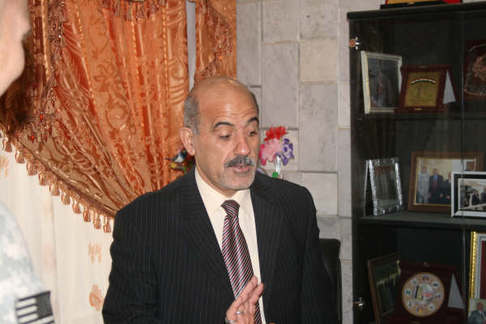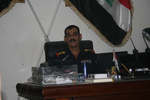August 14, 2008 | FDD’s Long War Journal
Diyala governor survives potential coup d’etat suicide bomber
BAQUBAH, IRAQ: Governor Ra' ad Rashid al Tamini didn' t seem in an overly jovial mood on Wednesday, even if his aides all agreed on his high spirits. An outsider may say his face displayed more relief than joy, which is no surprise: firing your militant police chief, then surviving an assassination attempt and a coup d'etat in a two-day period can wind even the most talented of political athletes.
Observers hope events this week in Diyala may portend for larger gains for civil society in Iraq, where demonstrations of civilian authority over security and military affairs can be rare. Indeed, implementing civil authority in Iraq has been the crux of the political adventure here since 2003, which is the reason successful military actions by Iraq' s central government against Shia militants in Basra and Sadr City in April and May were interpreted as political watersheds for the country' s leadership.
In Diyala, north of Baghdad, months of a “cold war” between al Tamini and the provincial police chief, Ghanem al Qurayshi, came to an end Aug. 10. Diyala' s provincial council voted 36-0 to oust the police chief, after numerous run-ins with councilors and the governor over the extent of his police authority. Even after the vote, the central government in Baghdad could have countermanded the decision, given al Qurayshi' s close ties to powerbrokers within the Shia-based political parties.
“We have enforced the laws,” said al Tamini in an interview. “Our society will improve so much if we can educate people about how the law strengthens the country. It was the first time the provincial council applauded for me. The decision came from their hearts.”
It was a series of missteps by the police chief that lead to his permanent dismissal. The council acted only after al Qurayshi bungled an order from the central government creating a civilian security detail for provincial officials and judges.
Instead of adapting the poorly written rule to local circumstances, like other provincial police chiefs, al Qurayshi stuck to the letter of the law, leaving public officials throughout the province woefully under protected at a time when Diyala qualifies as the most dangerous province in Iraq.
The day after his dismissal, several hundred of his supporters within the Iraqi Police staged a demonstration in front of the Diyala government complex. The protesters began chanting slogans, including a Saddam-era “with my blood, with my life, we support you” chant that curdles the blood of any Iraqi who felt the boot of the Hussein regime on their neck. It was this chant that steeled elements within Prime Minister Nouri al Maliki' s government past the point of no return.
Inside the governor' s office, al Tamini sat with General Ali Ghaidan, head of Iraqi Army ground forces in the region, listening to the chant on a cell phone. Upon hearing the protesters, General Ghaidan put the gears in motion in Baghdad to guarantee al Qurayshi' s permanent dismissal, but with an Iraqi twist. Al Qurayshi was given a promotion and moved to a deputy position in Baghdad with little direct influence, although it' s not sure whether he will accept the posting.
Finally, a male suicide bomber dressed as a female blew himself up as al Tamini and Ghaidan left the government complex to consult with the provincial council, killing two people and narrowly missing the governor' s vehicle.
The vote “was a unifying event for the council, giving them the first real taste of democracy “the kind that we take for granted every day,” said US Major Timothy Hunt, the main US military advisor to al Tamini.
Police Chief Had Support
There were numerous accusations of corruption against al Qurayshi, but very few stuck, and ultimately poor communication with elected leaders and a lack of appreciation for civilian authority, i.e. not following orders, which led to his downfall, rather than his ties to militants, Iraqis said.
While it' s doubtful al Qurayshi himself organized the protest, he walked outside and was viewed as supporting the chants, soaking up the personal adulation instead of ordering his subordinates to shut the protest down.
The chief still has support among other leaders in the provincial police, who view him as a strong military leader who brought police authority back from the brink in 2006 when the province was dominated by al Qaeda in Iraq and Mahdi Army extremists. Baqubah that year was declared the capital of the Islamic State of Iraq by an al Qaeda front organization, while Abu Musab al Zarqawi, al Qaeda in Iraq' s founder, was killed in Diyala by a US airstrike in June 2006.
“At the end of 2006, beginning of 2007, the security situation was very bad. When they asked for someone to become the IP [Iraqi Police] Chief, a lot of generals refused,' said Iraqi Police Colonel Ragheb Radhy Abbas. 'œHe accepted and started work. He was a great man, but the way he operated politically was not the best. He operated in a military fashion, more than as a policeman. He could not balance between his job and politics.'
Al Qurayshi was in charge during the period joint Coalition-Iraqi offensives that took back control over Baqubah and Diyala from insurgents. About 10,000 U.S. troops and an unknown number of Iraqi troops took part in the Arrowhead Ripper in March 2007. The Iraqi Police rolls in Diyala grew from 8,000 police at the end of 2006 to 18,000 in August 2008.
'œWhat the IP did yesterday was because they were intimidated by him,' al Tamini said. 'œIt shows and explains that he did it to himself. Most people are concerned with peace.'
Al Tamimi ordered an indefinite curfew in Baqouba after the suicide attack occurred. Major General Abdul Kareem Khaleef has become acting Diyala police chief.
Earlier this week, the Maliki government announced a weeklong suspension of military operations in the province to allow militants a chance to surrender. Iraqi forces have detained 663 wanted terrorists since the operation began on July 29, said Major General Mohammed al Askari, the spokesman for the Iraqi Ministry of Defense, in a press conference in Baghdad on August 13.

